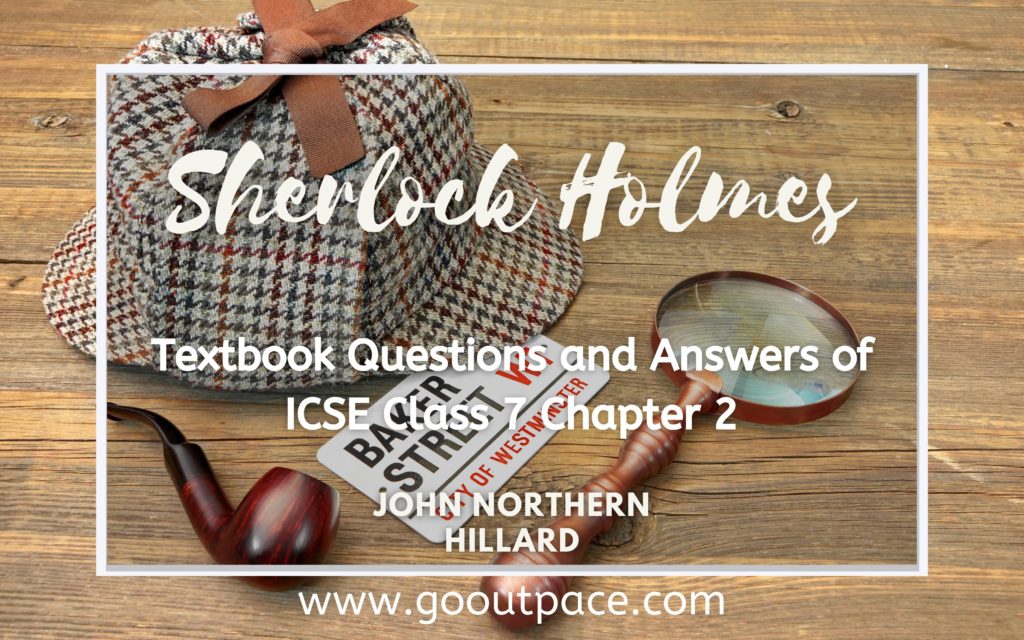You will go through Textbook Questions And Answers Of ICSE Board Class 7 Sherlock Holmes Chapter 2 written by John Northern Hillard. Understanding a text’s entirety is very important for a learner to score better in the exam. Efforts have been made to ensure a thorough and proper Textbook Questions And Answers Of ICSE Board Class 7 Sherlock Holmes Chapter 2 was written by John Northern Hillard.

Textbook solutions
A . Complete the sentence with words and phrases from the poem.
1 . Sherlock Holmes was an _______ man who pursued a _______.
_ ingenious, pursued.
2 . Holmes was able to solve cases with the help of clues like _____ or a ______.
_ a bit of string or a button.
3 . After Holmes had _____ his culprit , the person would be put _______.
_ bagged, safe behind the bars.
4 . The deeds of the other detectives would fill ______.
_ dozen tomes.
5 . Holmes would have solved the_____ case in ______.
_ Rue Morgue, in half a day.
6. The books of many well known detective writers were ______ when Holmes _______.
_ tossed , appeared upon the scene.
SHERLOCK HOLMES – CHAPTER 2 TEXTBOOK SOLUTIONS – ICSE CLASS 7 ENGLISH
B . Answer the questions with reference to context.
1 . ….we must admit that since he quit work,
life’s never been the same.
a . Why do you think life has not been the same for the poet since Holmes quit work?
b . How did the poet feel about Holmes’ work while the latter was still working?
c . What adjective does the poet use to refer to Holmes’ success in solving cases? Why do you think he uses this word?
d . What does the poet go on to say about Holmes’ intelligence?
Answers:-
a . It is evident that since Holmes quit work life has changed. The most probable reason is that Sherlock Holmes was a very clever man and always had new ideas . In his career he did something or tried doing something new to get new achievements in his career. The poet followed his conclusions which were based on facts and followed it sincerely. That’s why his life has not been the same since Holmes quit his work.
b . Sherlock Holmes was a perfectionist in his work. He always kept his wits on tap, he always had a clue and always had a perfect idea about what a criminal can do in the future. A bit of string, a button, a strand of hair in the bed cover was more than enough for him to identify the criminal and had him safe behind the bars.
c . The adjective the poet used for Sherlock’s success is ‘ monotonous’.
Sherlock was so perfect in his work that he achieved success in all his works. A bit of string, a button, a strand of hair in the bed cover was enough for him to take the culprit safe behind the bars. His success was repetitive but boring.
d . Sherlock was very ingenious man . He was clever and always made the perfect decision. He was so clever that he exactly knew that what a criminal could do in the future. A bit of string, a button or a strand of hair on the bed cover was more than enough for him to catch the criminal and put him safe behind the bars. He always achieved success in all the cases . The poet followed all his decision sincerely as he knew Holmes was best at his work.
2 . His friend Watson then would spin a yarn
from the details of the case….
a . Who is Watson? Whose friend is he?
b . What case is being referred to in these lines? How would Watson come to know of the case?
c . What would Watson do after Holmes had told him about the case?
d . What is meant by idiom ,’ spin a yarn’?
Answer:
a . Watson is one of the closest friend of Sherlock Holmes. He was the one with whom he could share every case while having coffee and nobody knew how long the conversation would last.
He is one of the closest friend of Sherlock Holmes with whom he could share anything and everything.
b . The detective cases of Sherlock Holmes is referred here. After solving every case he would take a black coffee and say that to Watson for two hours long.
After solving each cases Sherlock would share everything to Watson and then he would spin a yarn from the details of the case.
c .Once Sherlock would finish telling Watson his stories he would then convert those into long , fanciful stories and narrate them. He would then name them either as “ The Tokin Three” or “The Mystery Face”.
d . The idiom , ‘ spin the yarn’ means to tell a story especially a long drawn out and fanciful one. Watson after listening to Holmes story would spin the yarn and label them as “ The Tokin Three” or “The Mystery Face”.
SHERLOCK HOLMES – CHAPTER 2 TEXTBOOK SOLUTIONS – ICSE CLASS 7 ENGLISH
3 . ….but never one that can compare
with Mr Sherlock Holmes.
a . Who can never compare to Sherlock Holmes? What skills did other detectives had according to the poet?
b . Name some other detectives and their creators mentioned in the poem.
c . What happened to them after Holmes appeared on the scene?
d . How the poet go on to cheer for Holmes and Watson?
Answer:
a . The detectives such as Monsieur Lecoq , Auguste Dupin were some mentioned in the poet. According to the poet there were other detectives were brave , some were wise and some were experts in disguise. There were even some detectives who would fill a dozen of large , heavy books.
b . Monsieur Lecoq was a fictional detective created by the 19th century French writer , Emile Gaboriau.
The Murders in the Rue Morgue is a murder mystery written by Edgar Allan Poe. It is solved by Auguste Dupin, a detective who appears in the three stories by Poe.
Anna Katharine Green was one of the first writers of detective fiction in America. She is considered as the mother of detective novel.
c . The other detectives although might be shrewd, wise ,experts in disguise but all of them seemed to be null and void when Homes appeared on screen. It wouldn’t take even half a day for Sherlock to solve a the Rue Morgue. The novels of Gaboriau, the tales of Mrs. Green were tossed aside when Sherlock Holmes appeared on the screen.
d . The poet praised Holmes a lot. He cheered him by describing all his unique characteristics which made him a successful detective. He said that he was so perfect in his work that a small clue was enough to recognize the criminals and put them behind the bars. Other detectives seemed null and void when he appeared on screen . The poet prayed that the glory of Sherlock Holmes never dim.
The poet too praised his friend Watson who never left Holmes alone. He was a very faithful friend who could be trusted blindly . He was praised for his loyalty and faithfulness and he is always remembered along with Sherlock.
SHERLOCK HOLMES – CHAPTER 2 TEXTBOOK SOLUTIONS – ICSE CLASS 7 ENGLISH
Vocabulary.
A . Fill in the blanks with correct words related to detection.
1 . The police arrested the main _____ in the case.
A .witness B . suspect C . victim.
Ans:- B . Suspect.
2 . The knife found in John’s cupboard was a ____ in the car to draw attention from the real criminal, Mr . Worthington.
A . Red herring B . Canned trout C . Cured Salmon.
Ans :- A . Red herring.
3 . I have a ____ that M. Dupin’s next case is on it’s way.
A . Deduction B . Dējā vu C . Hunch.
Ans:- C . Hunch.
4 . There is no proof that the ____ was stolen from the computer in the inspector’s office.
A . Lead B . Evidence C. Motive.
Ans:- B . Evidence.
5 . The police believed that Mrs Ponsonby was the thief , but she had an ______ for the day of the break-in.
A . Arrest B . Alibi C . Album
Ans:- B . Alibi
6. The real_____ for the crime was greed and not a desire for justice, as the dacoits claimed.
A . Motive B . Motivation C . Motion.
Ans:- A . Motive
7 . The businessman hired a private eye to ______ the accountant whom he suspected of stealing money.
A . Paw B. Snout C . Tail.
Ans:- c. Tail.
8 . No one knew that Radhika was an intelligence officer working _____ to collect evidence against tgr crime lord.
A . Underdog B . Undercover C . Underbelly.
Ans:- B . Undercover.
SHERLOCK HOLMES – CHAPTER 2 TEXTBOOK SOLUTIONS – ICSE CLASS 7 ENGLISH
B . Complete the table with the synonyms of the given words from the poem.
Brave:-
_ bold, daring , courageous.
Deeds
_ action, achievements, activities.
Label
_ tag, stamp , mark.
Shrewd
_ sharp, cunning, crafty.
Admit
_ agree , confess, acknowledge.


